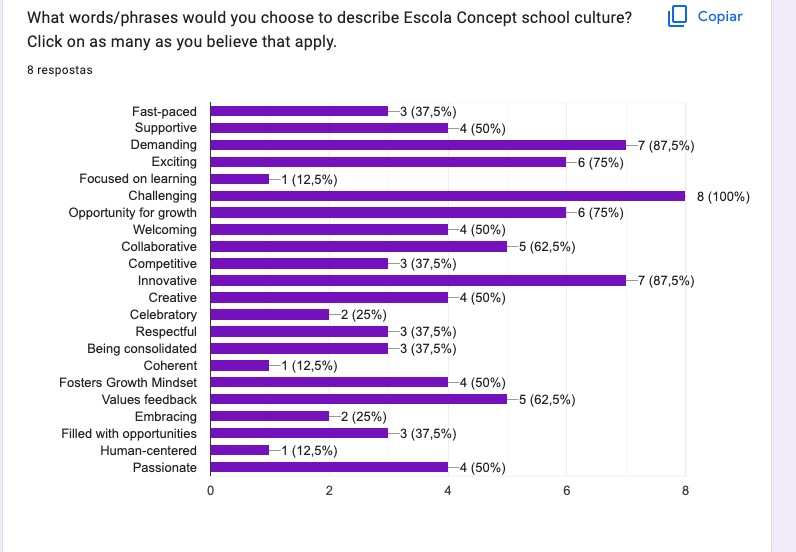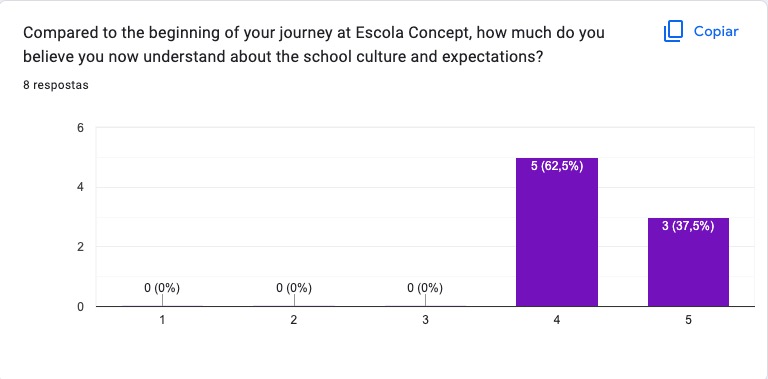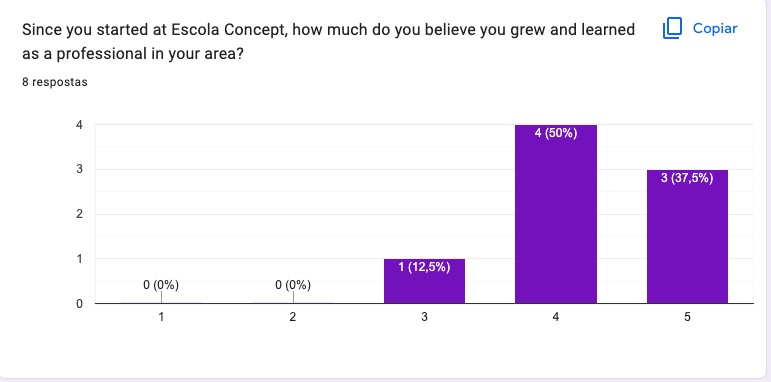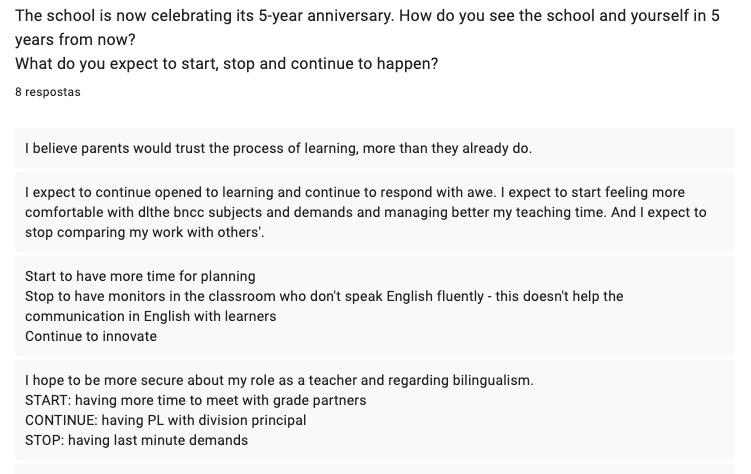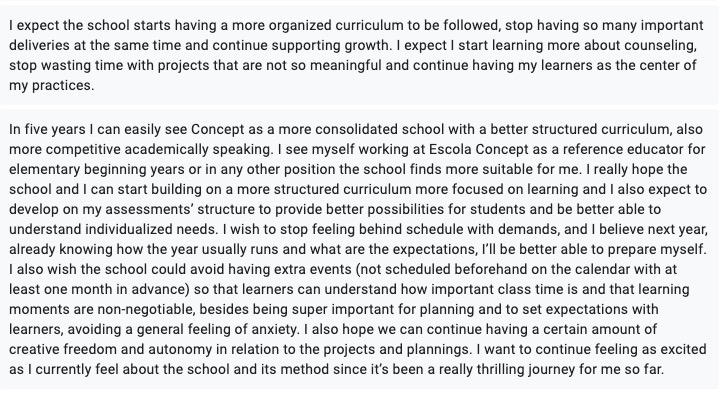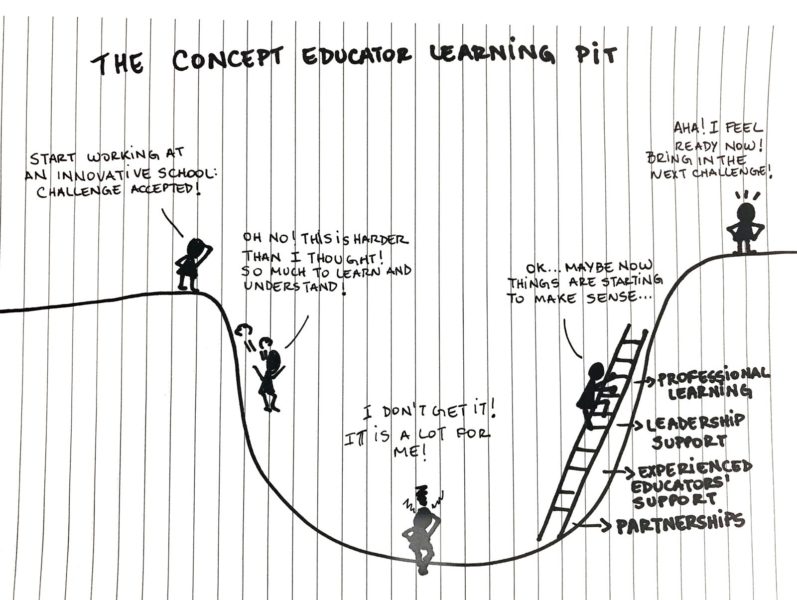Onbording new educators: a study on best practices to foster school culture
What is the impact of different Professional Learning opportunities on the onboarding process of new educators in an innovative school such as Escola Concept?
General topic of interest
During this year of 2022, I welcomed many new talents in my team of educators and, as Escola Concept requires educational practices and deliveries that are not known in other Brazilian schools, the onboarding and aculturation process might take effort, planning and time from the leadership team.
Along the year, it became relevant for me, as the division leader, to listen to my new educators' perception on the school culture itself, their understandign of expectations and the professional learning opportunities that, for them, were most impactful and effective. Therefore, with the opportunity of developing this Action Research, I became interested in measuring the perception of effectiveness of different Professional Learning Opportunities in the onboarding process of new educators during their first year at Escola Concept.
Participants
During the year, I welcomed 10 new Reference Educators in the Lower School Division, i.e., those who were hired and started working with us in the school year of 2022.
Literature Review
Diving deeper into the concept of "culture" has been a topic of my interest in the latest years, mainly because Escola Concept fosters the understanding of the 8 Cultural Forces, as in the book "Creating Cultures of Thinking: The 8 Forces We Must Master to Truly Transform Our Schools" by Ron Ritchhart, a senior research associate with Project Zero at the Harvard Graduate School of Education (2015, Jossey-Bass Ed.).
Besides, I have also searched for literature on School Leadership Skills to support my own growth as a Division Principal, understanding the importance of offering multiple opportunities for educators to be developed in their technical and interpersonal abilities is also key to promote a positive school culture of innovation. For that, I looked for articles on school culture and leadership that supported my thinking and framed my conclusions upon the data collected. One of these articles was "What makes a good school culture?", by Leah Shafer, published online on July 23rd, 2018 (link: https://www.gse.harvard.edu/news/uk/18/07/what-makes-good-school-culture).
Data collecting approach
For the data collection, I mostly used a comparative approach, gathering quantitative and qualitative answers from these educators and drawing conclusions on their perception in interviews during their meetings with me and their answers in the forms sent at the end of this school year.
Data collection tools/resources
Along the school year, I collected new educator's perception in a 1:1 conversation/interview with me, their principal, along the school year, registered in my appraisal documents. During this conversations, I collected words that they would use to describe the school culture. At the end of the school year, I applied a survey with them, asking specific questions about their perception on how effective the different Professional Learning opportunities were for their development (Action Research, Division Meetings, Individual Meetings, Lesson Observation and Feedback, Feedback on Planning, among others). In the survey I also included a list of words mentioned by them along the school year to define culture, they could choose more than one.
Emerging results
Analyzing our data, we could observe that, regarding the school culture, all the words selected were chose at least once. The words that were most mentioned by the educators were: challenging, innovative, demanding, exciting, opportunity for growth, collaborative and values feedback. The words that were least mentioned were: coherent, focused on learning , human-centered and celebratory.
All new educators consider that, by the end of this first year, they are already understanding the school culture and the expectations.
The learning opportunity that, in the new educator's vision, was more supportive to their learning about the school expectations was the Professional Learning week for new hires. Many educators also mentioned the grade level meetings as something that supported them in understanding the school expectations.
Talking about the next year, educators mentioned that they would like to continue with the grade level meetings that happen weekly, also mentioning their will to have feedback meetings with the Teaching and Learning Coach. New educators also mentioned wanting to meet the Academic Performance coach more and to meet the Division Principal individually and as a grade level.
As considerations for a 5 year plan, new educators mention as an area of improvement the time alloted for planning and the visibility of the curriculum to be followed. As areas of highlights, the support from the leadership, the innovative environment and PL opportunities.
Reflections
From the conversations and survey, we could notice that some points can be improved and addressed in the planning for the professional learning opportunities for next year. We understood from the data collected that we need to invest in PL moments that improve the perception and visibility of coherency, focus on learning , human-centered and celebratory mode in our school. It was important to reflect about which are the areas of focus regarding the educators' demands, allowing us a lot of food for thought regarding planning next year and the calendar of events, as well as the opportunities that will be offered. We could also understand that the acculturation in a school is a continuous process in our school and that it is not only built through professional learning, but also through the perception of many different elements that make a school. It is also important to acknowledge the process that a new educator goes through when starting to work at such an innovative and fast paced school. New educators, as lifelong learners, go through a learning pit, very similar to our young learners. At first, educators take a responsible risk to start in a very innovative school. At a second moment, they will face challenges to understand how the school works and start to face complications and contradictions trying to adjust to the new culture. With the leadership and experienced peers' support, they start to organize their ideas and understand it better. It is a lot to learn, but it starts making sense for them. Right next to it there is the part where the whole process connects and they finally start feeling more comfortable and ready to perform according to the school expectations, being now immersed in the culture. Living the process and understanding that not all of it will be comfortable is essential. Us, as leaders, are here to make those hard steps become more smooth and to make sure that educators feel supported at all times in this journey.


